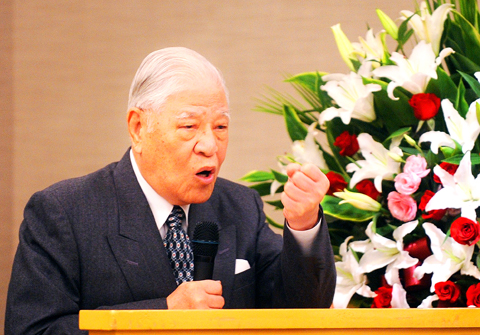Former president Lee Teng-hui (李登輝) yesterday introduced a new political association to the public, with the stated aim of deepening democracy in the country, which he said had fallen victim to ideology and partisan warfare.
Lee said the Lee Teng-hui Democracy Association (李登輝民主協會) was established to point out the flaws of the government and speak out for the people.
Bemoaning the fact that no progress has been made since 2000, Lee said the nation desperately needed a new wave of reform to deepen its democracy. Such reform initiatives should cover the areas of democracy, politics, education, the judiciary and spirit, he said.

PHOTO: LO PEI-DER, TAIPEI TIMES
During his 12-year presidency, Lee said his policy was to transform the country from an authoritarian state to a democracy and he was glad that goal was achieved with the help of the people.
Although Taiwan saw two transfers of power in 2000 and 2008, Lee said moral decline and cultural retrogression since then has become a major problem.
Lee said many people believe the two changes of government have made Taiwan’s democracy healthier and more mature, but in reality the two political camps have been engaged in virulent partisan competition at the expense of national interest and public well-being.
“People must vote the government out of power if it does a bad job,” he said. “People are the real masters of the country and it makes perfect sense for a master to change his servant if he cannot do his job properly.”
Lee urged the government to reach out to the opposition and seek consensus on national identity. As it will take a long time to resolve the complex issue of Taiwan’s statehood, he also urged politicians to handle political matters rationally and be tolerant of different ideologies and political positions.
Criticizing the government’s economic policy, Lee said it not only failed to address the unemployment problem, but also adopted a hands-off approach in managing China-bound investment and appeared not to care about the hardships the public is facing.
Lee also questioned China’s sincerity following its recent promises to help Taiwan sign free-trade agreements with other countries if Taipei signs an economic cooperation framework agreement (ECFA).
“It never means what it says and will lie if that serves its purposes,” he said.
Tadae Takubo, vice chairman of Friends of the Lee Teng-hui Association in Japan, expressed concern over the government’s China-friendly policy, saying Tokyo could not afford to ignore such a disturbing development.
“Taiwan’s attitude toward Japan, the US and China plays a significant role in the shifting military balance in the Asia-Pacific region,” he said.

A preclearance service to facilitate entry for people traveling to select airports in Japan would be available from Thursday next week to Feb. 25 at Taiwan Taoyuan International Airport, Taoyuan International Airport Corp (TIAC) said on Tuesday. The service was first made available to Taiwanese travelers throughout the winter vacation of 2024 and during the Lunar New Year holiday. In addition to flights to the Japanese cities of Hakodate, Asahikawa, Akita, Sendai, Niigata, Okayama, Takamatsu, Kumamoto and Kagoshima, the service would be available to travelers to Kobe and Oita. The service can be accessed by passengers of 15 flight routes operated by

GIVE AND TAKE: Blood demand continues to rise each year, while fewer young donors are available due to the nation’s falling birthrate, a doctor said Blood donors can redeem points earned from donations to obtain limited edition Formosan black bear travel mugs, the Kaohsiung Blood Center said yesterday, as it announced a goal of stocking 20,000 units of blood prior to the Lunar New Year. The last month of the lunar year is National Blood Donation Month, when local centers seek to stockpile blood for use during the Lunar New Year holiday. The blood demand in southern Taiwan — including Tainan and Kaohsiung, as well as Chiayi, Pingtung, Penghu and Taitung counties — is about 2,000 units per day, the center said. The donation campaign aims to boost

ENHANCING EFFICIENCY: The apron can accommodate 16 airplanes overnight at Taoyuan airport while work on the third runway continues, the transport minister said A new temporary overnight parking apron at Taiwan Taoyuan International Airport is to start operating on Friday next week to boost operational efficiency while the third runway is being constructed, the Ministry of Transportation and Communications said yesterday. The apron — one of the crucial projects in the construction of the third runway — can accommodate 16 aircraft overnight at the nation’s largest international airport, Minister of Transportation and Communications Chen Shih-kai (陳世凱) told reporters while inspecting the new facility yesterday morning. Aside from providing the airport operator with greater flexibility in aircraft parking during the third runway construction,

American climber Alex Honnold is to attempt a free climb of Taipei 101 today at 9am, with traffic closures around the skyscraper. To accommodate the climb attempt and filming, the Taipei Department of Transportation said traffic controls would be enforced around the Taipei 101 area. If weather conditions delay the climb, the restrictions would be pushed back to tomorrow. Traffic controls would be in place today from 7am to 11am around the Taipei 101 area, the department said. Songzhi Road would be fully closed in both directions between Songlian Road and Xinyi Road Sec 5, it said, adding that bidirectional traffic controls would